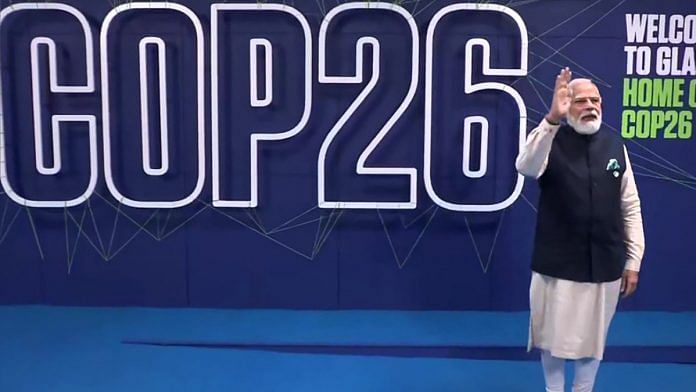The recently convened COP26, which was held in Glasgow, Scotland, brought together representatives of 197 member countries to set this century’s global climate goals. India, as a nation, representing 17.7 per cent of the world’s population, certainly holds an accolade in the discourse of climate change. Prime Minister Narendra Modi eloquently summarised the ‘Panchamrit solution’ at COP26 to be fulfilled by India in times to come.
To avoid a truncated picture, we must contemplate that as the global leaders discussed climate change inside the Scottish Event Campus, the roads opposite to it were filled with protesters marching and holding placards saying, “COP26, We are Watching You.” Here too, we keep an eye out and for whether this Panchamrit will in fact serve as the ‘amrit‘ (elixir of immortality) for an already ailing and suffocating world climate.
India’s path
To begin with, while promising reduced carbon emissions, developing countries including India have actually been advocating for an exemption to peak emissions to ensure an uninterrupted growth trajectory. As per the principle of Common but Differentiated Responsibility, the developed nations have historically been the major emitters and thus responsible for the current climate catastrophe that wreaks havoc world over. India, the third largest emitter, is thus likely to peak GHG emissions in the coming two-three decades.
But is the conundrum between development and a deteriorating environment really as mutually reinforcing? This is a fallacy of blindly aping the West and, in the process, reveling in the consequent ecological damages as a matter of ‘right.’ India, instead, with its vast geographical advantages in the form of a long coastline, as well as its tropical latitudinal extent, must aim to develop based on energy acquired from wind, solar, geothermal and hydrological sources.
This endeavour of increasing our reliance on clean energy sources not only ensures a morally, ethically and ecologically sound exemplification of development paths that others ought to emulate, but also enables us to attain the target for 500gw of non-fossil energy capacity.
On a separate note, coal currently accounts for around 60 per cent of India’s energy requirements. The present policy ecosystem of the Ggvernment seems to be incentivising an increase on coal reliance, rather than a diversion. For instance, under the Aatmanirbhar Bharat package, the Union government launched the first-ever auctions for commercial coal mining with the theme of “Unleashing Coal: New Hopes.” Whether or not this venture renders environment and climate protection mandates hopeless is fathomable.
Net Zero
Coming to the supposedly most promising collective goal declared at COP26 – Net-Zero. So what really is this whole debate over carbon neutrality that seems to be attracting all nations?
Net Zero or Carbon Neutrality simply refers to achieving an overall balance between greenhouse gas emissions produced and those taken out of the atmosphere. So, a country may achieve net-zero even at its current levels of emissions by investing in carbon sink, capture and storage technologies. The earliest deadline for this goal comes from the United States at 2050, which is at best a post-dated cheque on perhaps an already depleting reserve of our planet earth.
Moreover, the declared Net Zero targets only pertain to carbon emissions, while other more stubborn contributors to GHG such as Methane, comprising 20 per cent of total emissions and 25 times as potent in trapping heat, find no mention. India specifically has shied away from signing the Global Methane Pledge at COP26, despite being the third-largest emitter of Methane globally.
Glasgow summit is seen as a successor to the 2015 Paris Climate Agreement, which aimed to limit the global temperature rise to 1.5-2 degree Celsius at the turn of the century. As per an IPCC report, these targets are likely to be missed and ocean warming has led to irreversible climate change with episodes of urban flooding, severe cyclones, increased mean rainfall, melting of glaciers, recurring episodes of severe heat waves becoming frequent and visible, even as I type these words.
India’s action plan
The metropolitan city of Chennai is presently flooded owing to excess bouts of rainfall. The devastation caused by cyclone Amphan is still not out of our collective conscience. As per the Global Climate Risk Index, published by global environmental think tank GermanWatch, India is amongst the top 10 most vulnerable countries when it comes to severe climate-induced disasters.
So, really, is the road ahead only gloomy? I reckon not. The way forward lies in the 3As — accountability, adaptation and an amicable conservation strategy.
To enhance our accountability, India needs to frame a special climate law dealing with climate justice. Presently, offences under Environment Protection Act are only punished under relevant sections of the Indian Penal Code. It lacks soul, flesh and, most importantly, teeth to enforce climate action.
If climate change is the stage, adaptation needs to be at the centre of it. Initiatives such as Coalition for Disaster Resilient Infrastructure, need to come into the spotlight. Domestically, materialising benefits out of the National Action Plan for Climate Change as well as re-orienting our short, medium and long-term environmental targets, to suit the changing needs should be the goal.
Finally, an amicable conservation strategy can be a stepping stone towards a more just means of environmental activism. In doing so, we must approach conservation from the viewpoint of Biocentrism which regards environment not as a means, but as an end in itself, and advocates for its protection on moral grounds. These are foundational values for our country inscribed in our Constitution, which calls for safeguarding the environment not just as a Fundamental Duty of the citizens but also as a Fundamental Right as well as a Directive Principle of State Policy for the government to adhere to. Climate Change dealings thus, in today’s day and age, need to become an integral component of our staple diets rather than simply an emergency elixir of medicines.
Kirti Bhargava is a student at Raus IAS Study Circle, New Delhi. Views are personal.




